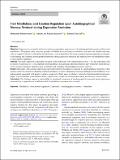Files in this item
Trait mindfulness and emotion regulation upon autobiographical memory retrieval during depression remission
Item metadata
| dc.contributor.author | Isham, Aleksandra Eriksen | |
| dc.contributor.author | del Palacio Gonzalez, Adriana | |
| dc.contributor.author | Dritschel, Barbara | |
| dc.date.accessioned | 2020-09-10T09:30:04Z | |
| dc.date.available | 2020-09-10T09:30:04Z | |
| dc.date.issued | 2020-09-10 | |
| dc.identifier | 269905550 | |
| dc.identifier | 2c777fc4-5d95-452d-8453-4d801f1a12b6 | |
| dc.identifier | 000568173600001 | |
| dc.identifier | 85090769972 | |
| dc.identifier.citation | Isham , A E , del Palacio Gonzalez , A & Dritschel , B 2020 , ' Trait mindfulness and emotion regulation upon autobiographical memory retrieval during depression remission ' , Mindfulness , vol. First Online . https://doi.org/10.1007/s12671-020-01494-4 | en |
| dc.identifier.issn | 1868-8527 | |
| dc.identifier.other | ORCID: /0000-0002-0909-6323/work/80257971 | |
| dc.identifier.uri | https://hdl.handle.net/10023/20600 | |
| dc.description | This work was supported by the Danish National Research Foundation (grant DNRF89: APG) and the University of St Andrews (AEI and BD). | en |
| dc.description.abstract | Objectives Depression is associated with both emotion dysregulation upon retrieval of autobiographical memories and low trait mindfulness. The present study raised the question of whether these processes are related to each other and whether they may reflect a cognitive-affective vulnerability in individuals at risk of depression. The study examined emotion regulation in response to involuntary and voluntary autobiographical memories during depression remission and explored how trait mindfulness relates to such emotion regulation. Methods The study employed a naturalistic design in which individuals with remitted depression (n = 35) and individuals with no history of depression (n = 32) completed a trait mindfulness measure and a structured memory diary where they rated state use of five emotion regulation strategies upon involuntary and voluntary autobiographical memory retrieval. Results Individuals with remitted depression reported heightened brooding in response to autobiographical memories when memory retrieval occurred involuntarily, and trait mindfulness was low. Depression remission and higher trait mindfulness were independently associated with greater cognitive reappraisal efforts upon involuntary retrieval of autobiographical memories. Higher trait mindfulness predicted less memory suppression, irrespective of depression history and memory retrieval mode. Conclusions The findings suggest a vulnerability in emotional processing of autobiographical memories during depression remission that is dependent on mindfulness skill level and how memories come to mind. | |
| dc.format.extent | 13 | |
| dc.format.extent | 406612 | |
| dc.language.iso | eng | |
| dc.relation.ispartof | Mindfulness | en |
| dc.subject | Mindfulness | en |
| dc.subject | State emotion regulation | en |
| dc.subject | Depression | en |
| dc.subject | Autobiographical memory | en |
| dc.subject | Naturalistic | en |
| dc.subject | BF Psychology | en |
| dc.subject | E-DAS | en |
| dc.subject.lcc | BF | en |
| dc.title | Trait mindfulness and emotion regulation upon autobiographical memory retrieval during depression remission | en |
| dc.type | Journal article | en |
| dc.contributor.institution | University of St Andrews. School of Psychology and Neuroscience | en |
| dc.identifier.doi | 10.1007/s12671-020-01494-4 | |
| dc.description.status | Peer reviewed | en |
This item appears in the following Collection(s)
Items in the St Andrews Research Repository are protected by copyright, with all rights reserved, unless otherwise indicated.

